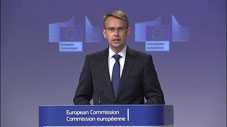
Appointment of Supreme Court judges goes against April 19 agreement and EU MFA conditions, EU spokesperson says
By Khatia Bzhalava
Thursday, July 15
The EU Commission has reported that failure to postpone the appointment of judges to Georgia’s Supreme Court could negatively affect the disbursement of the second tranche of EU’s Macro-Financial Assistance (MFA) to Georgia. According to the Lead Spokesperson for the External Affairs of the EU Peter Stano, the appointments go against the recommendations of OSCE/ODIHR and Venice Commission, as well as the key provisions of the April 19 Agreement and EU Macro-Financial Assistance conditions.
Georgian parliament appointed six of nine judges to the country’s Supreme Court on July 12, despite the calls from local NGOs, opposition parties and the international community to pause the process until fundamental reforms are implemented in the judiciary. The majority of the opposition MPs did not participate in the voting.
“The appointment of Supreme Court judges is a missed opportunity for the Georgian authorities to prove their commitment to genuine and comprehensive reform of the judiciary. These developments carry a risk of damaging judicial independence and public trust, ” said the European Commission Spokesperson.
He stressed that the EU is ready to further discuss justice reform, especially in the context of the April 19 Agreement and decisions regarding EU macro-financial assistance to Georgia.
Deputy Minister of Finance Giorgi Kakauridze commented on the statement released by the European Commission and said that it is important to properly fulfil all the obligations and receive the grant part of the aid amounting to about ˆ10 million. He noted that it would be unfortunate if Georgia fails to receive the EU-financial tranche as these funds are included in this year's budget as part of the revenue, however, he explained that even in that case, there will not be a problem with the budget expenditures and no direction will be left without funding.
Georgian Dream MP Mikheil Sarjveladze also responded to the statement of the EU commission and stressed that there is no risk of being in any conflict with the prerequisite for the second tranche of budget aid or any of the provisions of the Charles Michel document. “If you pay attention, there is a willingness to negotiate and consult,” he noted.
Sarjvrladze claims that the election process of judges of the Supreme Court was conducted per the recommendations of the Venice Commission.
In the recent interim report, OSCE/ODIHR expressed concern over the fairness and equality of the nomination process and stressed that the candidates were presented to the Parliament under the circumstances of low public trust in the independence of the judiciary.


